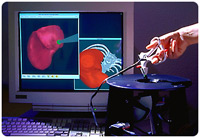Simulator trains surgeons to be more efficient
- 18 May 2009
 |
|
Simulation surgery |
Danish research has found that using simulators to train surgeons can make them twice as quick and more precise when operating.
A study carried out by a team at Copenhagen University Hospital to assess the effect of virtual reality training on keyhole surgery showed that surgeons trained using simulators took a median time of 12 minutes to complete the operation.
Those trained using traditional methods, learning by solely working alongside doctors, took a median time of 24 minutes to carry out the same procedure.
The study, published in the current issue of the British Medical Journal, also showed that the performance level of novices trained on the simulator was comparable to that of intermediately experienced laproscopists and that they carried out better work.
Conductors of the research put the first and second year medics specialising in gynecology and obstetrics in two groups, one which had traditional training and another which supplemented this with simulator training.
Lead researcher, Christian Rifbjerg Larsen, said: “Simulator training should be incorporated into the curriculum for all surgical trainees before they embark on patient procedures.
“This can potentially improve patient safety and operation room efficiency.”
Unlike other countries, such as Israel, there are no strict guidelines in the UK about how much time should be spent on simulation training.
In March the chief medical officer’s annual report highlighted the need for surgeons to be trained using simulation techniques.
The report, published by Professor Sir Liam Donaldson, said that surgeons trained using simulation methods made fewer errors and carried out technically more exact procedures.
The CMO called for simulation training to be better integrated into medical practice and better funded.
Also in March, the Royal College of Surgeons opened a clinical skills unit to provide the UK with one of the most advanced surgical teaching facilities in the world.
The simulation centre is available to other members of the surgical team, including anesthetists, physicians and theatre nurses, as well as surgeons.
College President, John Black, said: “The skills centre will change the way surgical training is delivered in the UK. Traditionally, measuring performance in the operating theatre has concentrated on surgeons alone.”
Link and Demo
Effect of virtual reality training on laparoscopic surgery
Related Hi-Tech features in 150th CMO report




